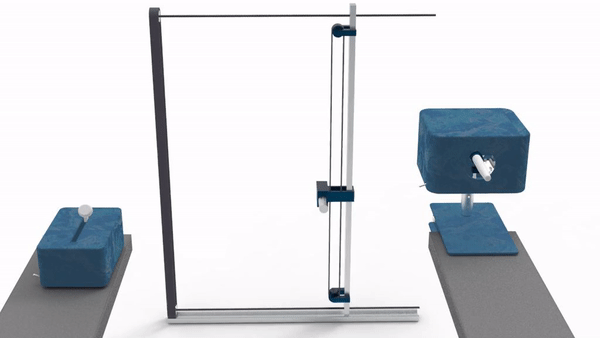Introduction to Physical Computing (60-223) is a 10-credit semester project-based course offered at Carnegie Mellon University by the School of Art under the auspices of IDeATe.

Art Enabler by Team Amy (a final project from fall 2020)
Professor: Robert Zacharias, rzachari@andrew.cmu.education (subtract the cation)
TA: Catherine Yu, tianhony@andrew.cmu.education (subtract the cation)
Class meetings
- Tuesdays and Thursdays, 9:05–10:55 a.m., room A10 in Hunt Library (IDeATe’s Physical Computing Lab)
Lab hours
- RZ: 11 a.m. to noon, Tuesdays and Thursdays
- CY: noon to 1 p.m., Fridays
- liberally available outside of these times (please email for an appointment)
Course synopsis
The first half of this practical project-based course is spent covering the basic technical skills (including electronics, programming, and hardware) needed to build simple interactive objects with embedded behavior using the Arduino microcontroller. Inputs to read information about the world include sensors such as an ultrasonic ranger, thermometer, light sensor, and human inputs like buttons and knobs. Outputs to affect the world include actuators such as motors, LED lights, speakers, and haptic feedback devices. Individual and group projects challenge students to apply their technical skills in creative ways. The class will be working with a local group of people living with disabilities who serve as design clients for the final project; students conjure and build functioning assistive devices of a practical or whimsical nature for their critique and feedback. Readings and guest speakers address topics pertaining to design for people with different abilities.
Syllabus
Topic and assignment schedule
| Tuesday | Thursday |
|---|---|
| Aug. 31st introductions IDeATe walking tour Homework 1: Intro assigned |
Sept. 2nd due: Homework 1 syllabus quiz Diary of Sorrows many kit parts handed out Homework 2: Asynchronous learning assigned |
| Sept. 7th due: Homework 2 draw.io for schematics additional kit parts handed out Homework 3: Completing asynch learning assigned |
Sept. 9th due: Homework 3 technical Q&A Project 1: A Double Transducer introduced |
| Sept. 14th due: Project 1 ideation discussions of above with course staff |
Sept. 16th Project 1 work day with Catherine (Zach is out) |
| Sept. 21st Project 1 work |
Sept. 23rd Project 1 work |
| Sept. 28th due: Project 1 |
Sept. 30th Project 2: Assistive Device introduced Project 2: Brainstorming assigned |
| Oct. 5th due: Project 1 documentation due: Project 2 Brainstorming |
Oct. 7th Project 2 prototype work day |
| Oct. 12th due: Project 2: Prototype |
Oct. 14th no class: mid-semester break |
| Oct. 19th due: Homework 4 Guest speaker: Emily Eckel Fusion360 and lasercutting tutorial |
Oct. 21st Project 2 work day |
| Oct. 26th Project 2 Final Critique |
Oct. 28th Final project initial meetings |
| Nov. 2nd no class: time given for final project interviews due: Project 2 documentation |
Nov. 4th Final project interview debriefing and ideation discussions |
| Nov. 9th Final project prototype work day |
Nov. 11th Final project prototype work day |
| Nov. 16th Final project prototype work day |
Nov. 18th Final project: Prototype Critique |
| Nov. 23rd Final project work session |
Nov. 25th no class: Thanksgiving break |
| Nov. 30th Final project work session |
Dec. 2nd Final project: Final critique |
